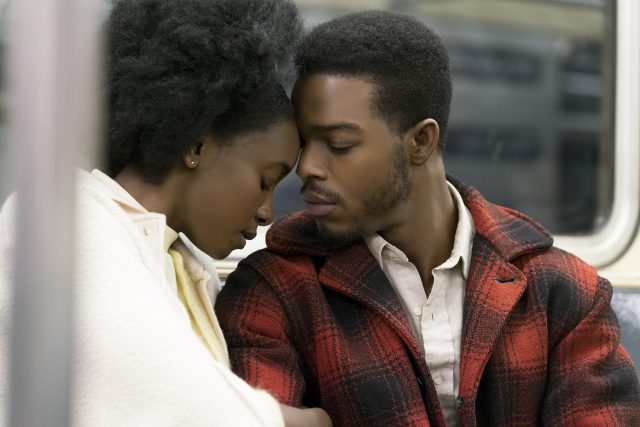If Beale Street Could Talk: The Fire This Time, by David Bax

With 2016’s brilliant blue Moonlight and even with 2008’s nearly monochromatic Medicine for Melancholy, Barry Jenkins has made it clear how much he values the use of color as a means of transmitting moods, situations, stories and fates. With his newest film, the towering If Beale Street Could Talk, he’s nudged the faders all the way up on those impulses, giving us a palette to chew over or just gawk at as we see fit. The central couple starts in blue and yellow costumes that match not just each other but also their surroundings, be they public transportation spaces or, regrettably, the glass-walled visiting area of a prison. Later, however, we see them in red (him) and green (her). Except it’s not later; the story is not told in strict order. So how did their colors come to change and what does it mean that they did so? You could watch If Beale Street Could Talk a hundred times and come away with different answers after each viewing. And the film is so hypnotically lush and powerful, you probably wouldn’t mind doing just that.
KiKi Layne stars as Tish, a young department store employee who’s only just found out that she’s pregnant, an especially inconvenient turn of events given that the child’s father, her fiancé, Fonny (Stephan James), is jailed and awaiting trial on charges of which he is clearly innocent, not that that’s likely to help him in court. If Beale Street Could Talk, based on the novel by James Baldwin, glides back and forth between the couple’s early days of love and the efforts of Tish, her family (Regina King, Colman Domingo and Teyonah Parris) and Fonny’s father (Michael Beach) to free the unjustly imprisoned young man.
After Raoul Peck’s 2016 documentary I Am Not Your Negro and the fact that his writings about privilege and representation, among other things, are so relevant to ongoing discussions in the present day, Baldwin, who passed away in 1987, has been a subject of interest and rediscovery recently. If Beale Street Could Talk is a part of that continuum but, even with Samuel L. Jackson reading Baldwin’s words directly into the viewer’s ear in Peck’s film, this one feels more personal. There’s a kinship, perhaps, between him and Jenkins, both artists who broach frank truths yet do so with poetry. Even the coarse language—from lewd sexual slang to racial slurs—are written and presented with a florid theatricality. Here, the cast (which, in addition those already mentioned, includes Brian Tyree Henry) deserves as much credit as Jenkins. They do with their words what he does with his mise en scène because they know what Baldwin knows and what his characters know, that for folks like them, presentation and appearance can be crucial not only to their identity but to their very survival.
If Beale Street Could Talk‘s fractured timeline, swinging back and forth between happy times and sad ones, finding the sadness in the former and the happiness in the latter, highlights that it is not the story of a single injustice done to a single man and his loved ones. It’s a story of an ongoing injustice that ripples through time.
Crucially, too, this is not just a depiction of hardship and suffering. There is boundless beauty in If Beale Street Could Talk. Every moment is built on generations of love and memory. When Fonny runs into an old friend, Daniel (Henry), the connection between them pulls us in even though we’ve never met Daniel before. The reunion is joyous. And then, a few beers in, Daniel spills his pain out on the table and we are crushed. This vacillation between grins and grimaces is the rhythm of If Beale Street Could Talk.
Jenkins has never been a trepidatious filmmaker but we’ve never seen him in a mode of such supreme confidence as this. Like Tish, If Beale Street Could Talk never wobbles and never compromises. It will withstand all of the hundreds of revisits it’s sure to get.




























